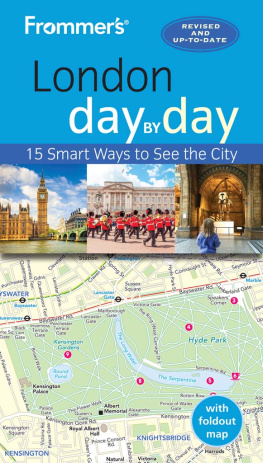



Published by
FROMMER MEDIA LLC
Copyright 2014 by Frommer Media LLC, New York City, New York. All rights reserved. No part of this publication may be reproduced, stored in a retrieval system, or transmitted in any form or by any means, electronic, mechanical, photocopying, recording, scanning or otherwise, except as permitted under Sections 107 or 108 of the 1976 United States Copyright Act, without the prior written permission of the Publisher. Requests to the Publisher for permission should be addressed to the Permissions Department, Frommer Media LLC at .
Frommers is a registered trademark of Arthur Frommer. Used under license. All other trademarks are the property of their respective owners. Frommer Media LLC is not associated with any product or vendor mentioned in this book.
ISBN 978-1-62887-065-7 (e-book)
Editorial Director: Pauline Frommer
Editor: Arthur Frommer
Production Editor: Heather Wilcox
Cartographer: Elizabeth Puhl
Cover Design: Howard Grossman
For information on our other products or services, see www.frommers.com.
Frommer Media LLC also publishes its books in a variety of electronic formats. Some content that appears in print may not be available in electronic formats.
5 4 3 2 1
ABOUT THE AUTHORS
Donald Olson is a novelist, playwright, and travel writer based in New York and Portland, Oregon. His travel stories have appeared in The New York Times, National Geographic, and many other national publications, and he has authored travel guides to Germany; England; Oregon; London; Vancouver, BC; and destinations throughout Europe and North America. Donald is the author of eight novels; three of them, written under the pen name Swan Adamson, have been translated into French and Russian. His plays have been produced in the United States, London, and Amsterdam. Donalds newest book, Gardens of the Pacific Northwest, will be published in 2014 by Timber Press.
Stephen Brewer has been writing travel articles and guides for almost 3 decades. As an editor and writer, he has focused on European coverage for such magazines as Connoisseur and Geo. He has written numerous guides for Frommers, Fodors, DK Eyewitness, Unofficial Guides, and Insight as well as authoring Beautiful Small Coastal Towns for Rizzoli. Stephen resides in Manhattan.
ABOUT THE FROMMER TRAVEL GUIDES
For most of the past 50 years, Frommers has been the leading series of travel guides in North America, accounting for as many as 24% of all guidebooks sold. I think I know why.
Though we hope our books are entertaining, we nevertheless deal with travel in a serious fashion. Our guidebooks have never looked on such journeys as a mere recreation, but as a far more important human function, a time of learning and introspection, an essential part of a civilized life. We stress the culture, lifestyle, history and beliefs of the destinations we cover, and urge our readers to seek out people and new ideas as the chief rewards of travel.
We have never shied from controversy. We have, from the beginning, encouraged our authors to be intensely judgmental, criticalboth pro and conin their comments, and wholly independent. Our only clients are our readers, and we have triggered the ire of countless prominent sorts, from a tourist newspaper we called practically worthless (it unsuccessfully sued us) to the many rip-offs weve condemned.
And because we believe that travel should be available to everyone regardless of their incomes, we have always been cost-conscious at every level of expenditure. Though we have broadened our recommendations beyond the budget category, we insist that every lodging we include be sensibly priced. We use every form of media to assist our readers, and are particularly proud of our feisty daily website, the award-winning Frommers.com.
I have high hopes for the future of Frommers. May these guidebooks, in all the years ahead, continue to reflect the joy of travel and the freedom that travel represents. May they always pursue a cost-conscious path, so that people of all incomes can enjoy the rewards of travel. And may they create, for both the traveler and the persons among whom we travel, a community of friends, where all human beings live in harmony and peace.

Arthur Frommer
T he word is out and maybe youve heard it: Germany is one of Europes great travel destinations. Every year, more and more visitors from around the globe are discovering the pleasures to be found in Germanys cities, towns, and countryside. Tourist numbers have risen steadily in the 25 years since the countrys dramatic reunification in 19891990 and show no sign of slowing down.
Germanys appeal is really no great mystery. Moody forests, jagged Alpine peaks, and miles of neatly tended vineyards are not just scenic but the stuff of legend, places that have inspired fairy tales and where much of Western history has been played out. The Germans more than anyone appreciate the soothing tonic of a hike in the Black Forest or a stroll on North Sea dunes, and just seeing these storied lands from a train window can be good for the soul. The cities are treasure-troves not just of great art and history but of culture, sophisticated lifestyles, and, from ever-changing Berlin to old-world Baden-Baden, cutting-edge architecture. Foodwell, dont write off the cuisine as just a lot of heaping plates of wurst and sauerkraut and schnitzel with noodles. For one thing, these traditional dishes are delicious, and one of the pleasures of traveling in Germany is discovering time-honored regional favorites.
So, lets look a little more deeply into why your travels in Germany will be filled with pleasures that go way beyond the spectacle of dirndls, lederhosen, Alpine meadows, and half-timbered houses (although the sight of any of these can be a bit of a travel thrill, too).
Ditch Those German Stereotypes
So what about the people? Everyone seems to have an opinion about the German character except for the Germans themselves. The militaristic Nazi past that continues to haunt Germany has given rise to many stereotypes. But if you connect with just one German person on your trip, chances are that all the stereotypes youve heard about will crumble to dust. Germany today is the most pacifistic country in Europe, sometimes to the annoyance of its neighbors and allies. Overall, it has one of the worlds highest levels of educational attainment and technological achievement. Germany never got caught up in the real-estate bubble that sent so many countries freefalling into recession, and its unemployment rate is about 5 percent, the lowest in the European Union. The Germans have their rules and ways of doing things, which sometimes seem stiff and bureaucratic, but clearly they are doing something right.
Many travelers base their notions of national character on their experiences with hotel employees and the waitstaff in restaurants. In that sense, Germanys hospitality industry has gone through a real sea change in the past few years. Hospitality was never lacking in Germany, but it was sometimes accompanied by a manner that seemed a little less than welcoming. Today youll find that Germans have embraced the American model of friendliness and service. Whats also true is that there is a German level of professionalism in all service-related jobs that someone accustomed to the slap-dash and sloppy might find almost bewildering. A waiter in Germany does not behave like your overly familiar best friend, as is so often the case in the U.S. Thats because waiters in Germany are paid a living wage and dont have to hustle for tips.
Next page








